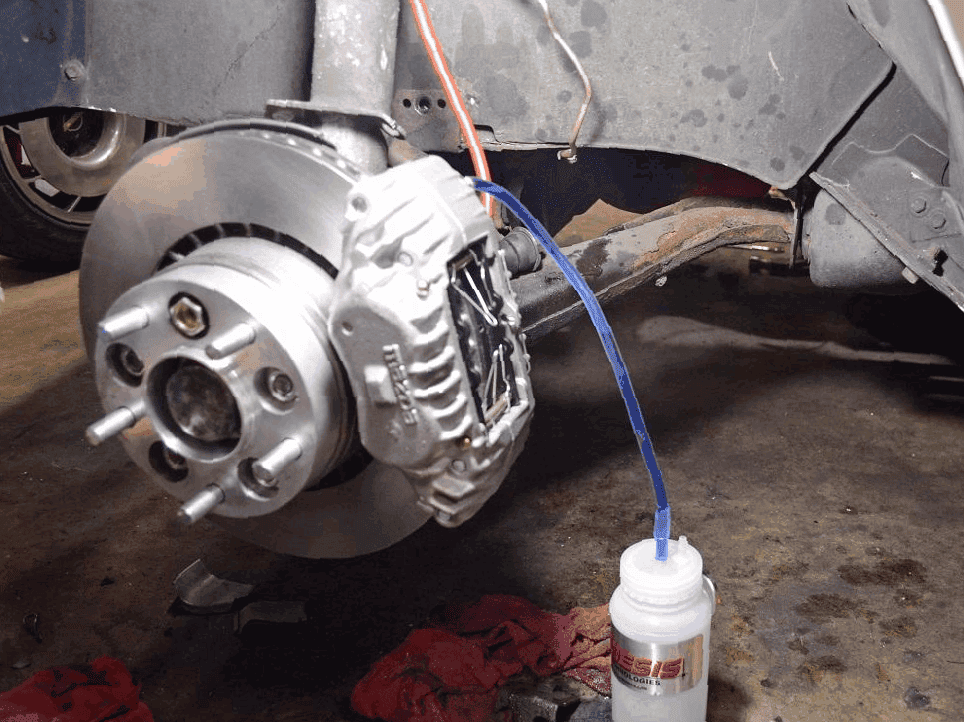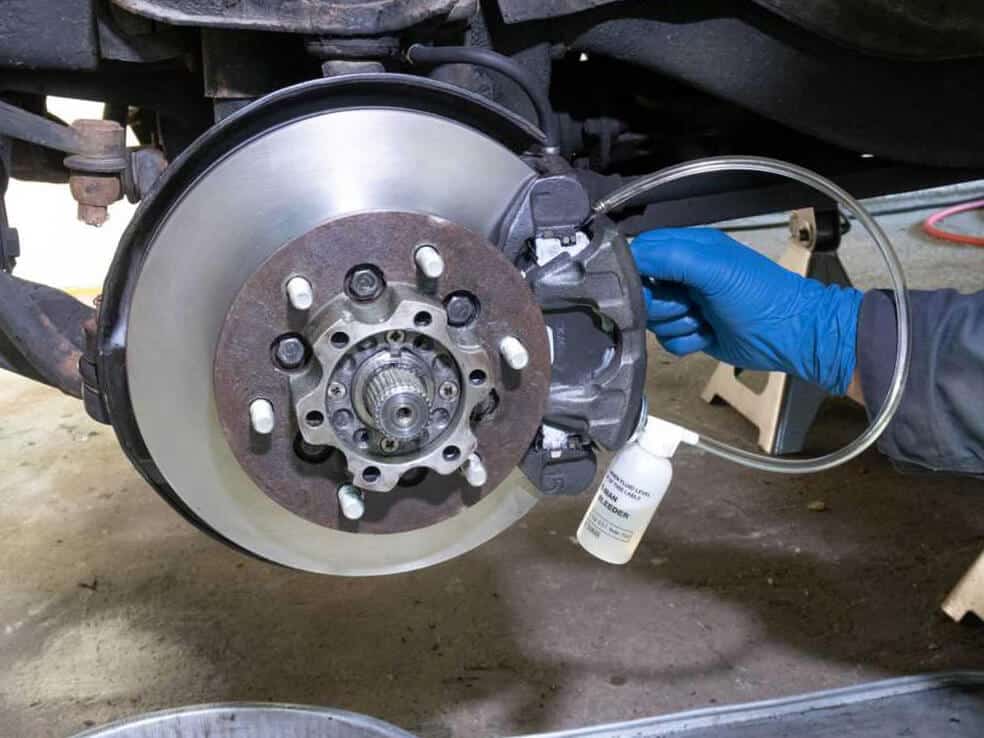Introduction
As a driver, it’s essential to know your vehicle’s needs. One such need is the timely brake system flush. But what is it, how much does it cost, and how does it impact your vehicle’s performance? Let’s dive into the details!
What is a Brake System Flush?
A brake system flush involves removing the existing brake fluid from your vehicle’s brake system and replacing it with fresh fluid. This process is vital because over time, brake fluid can become contaminated with dirt and other debris, which can compromise the efficiency of the braking system.
How Much Will it Cost to Perform a Brake System Flush in Canada?
In Canada, the cost of a brake system flush can vary depending on the type of vehicle and the mechanic’s rate. On average, the parts alone can range from $20 to $40, while labour can cost anywhere from $50 to $100. The entire process can take up to two hours, making the total cost range between $70 and $140.

What are the Symptoms of Contaminated or Old Brake Fluid?
• Spongy or Soft Brake Pedal: If the brake pedal feels spongy or soft when pressed, it could be a sign that the brake fluid is contaminated or old. This often happens due to the presence of air or moisture in the fluid.
• Longer Braking Distances: If it takes longer than usual to stop the vehicle, it might be due to contaminated brake fluid that can’t transfer force efficiently.
• Strange Noises When Braking: Unusual sounds, such as grinding or squeaking when you press the brake pedal, could indicate a problem with the brake fluid or other parts of the braking system.
• ABS Light On: The Anti-lock Brake System (ABS) light illuminating on your dashboard could be a sign of old or contaminated brake fluid, as it may affect the ABS’s ability to function properly.
• Discolored Brake Fluid: Brake fluid that looks dark or dirty may be contaminated. Fresh brake fluid is usually clear or light yellow, while older fluid may darken due to dirt, debris, or wear particles.
• Unusual Smell When Braking: If you notice an unusual burning smell when you brake, it could be a sign of overheated brake fluid, which may need to be replaced.
• Uneven Brake Pad Wear: If the brake pads are wearing unevenly, it might be due to contaminated brake fluid that isn’t distributing hydraulic pressure evenly.
How Often Should a Brake System Flush be Done?
Brake fluid should be flushed every 20,000 to 45,000 kilometers, or approximately every two years. However, always consult your vehicle’s owner manual for the manufacturer’s recommended intervals.
How Does Brake Fluid Become Contaminated or Degrade?
• Decreased Braking Efficiency: Contaminated or old brake fluid can reduce the efficiency of the braking system, leading to a spongy or unresponsive brake pedal and longer stopping distances.
• Corrosion of Brake System Components: Contaminants in the brake fluid can cause corrosion of various brake system components, potentially leading to brake failure.
• Premature Wear of Brake Parts: Old or contaminated brake fluid may cause excessive wear and tear on brake parts, resulting in costly repairs or replacements.
• Overheating and Boiling: Brake fluid contaminated with water lowers the fluid’s boiling point, which can lead to overheating and boiling of the fluid under intense braking conditions, resulting in a phenomenon known as brake fade.
• Brake System Damage: In the worst cases, old or contaminated brake fluid can cause significant damage to the brake system, which can be expensive to repair and potentially dangerous if it leads to brake failure.
How Can Contaminated or Old Brake Fluid Affect Brake Performance?
• Decreased Braking Efficiency: Contaminated or old brake fluid can reduce the efficiency of the braking system, leading to a spongy or unresponsive brake pedal and longer stopping distances.
• Corrosion of Brake System Components: Contaminants in the brake fluid can cause corrosion of various brake system components, potentially leading to brake failure.
• Premature Wear of Brake Parts: Old or contaminated brake fluid may cause excessive wear and tear on brake parts, resulting in costly repairs or replacements.
• Overheating and Boiling: Brake fluid contaminated with water lowers the fluid’s boiling point, which can lead to overheating and boiling of the fluid under intense braking conditions, resulting in a phenomenon known as brake fade.
• Brake System Damage: In the worst cases, old or contaminated brake fluid can cause significant damage to the brake system, which can be expensive to repair and potentially dangerous if it leads to brake failure.
Tips to Maintain an Adequate Brake System
• Regularly check the brake fluid level and quality
• Adhere to the recommended brake fluid change intervals
• Use only the type of brake fluid recommended by the vehicle manufacturer
• If you notice any change in your brakes’ performance, have them inspected by a professional immediately

Is it Safe to Drive with Contaminated or Old Brake Fluid?
Driving with contaminated or old brake fluid is not advisable due to the significant risk it poses to both your vehicle’s functionality and your overall safety on the road. Brake fluid plays a critical role in your vehicle’s braking system, acting as the hydraulic fluid that transfers the force from your foot on the pedal to the brake pads that clamp onto the rotors to halt your vehicle. If the brake fluid is contaminated or old, its ability to perform this function effectively can be severely compromised. This can result in a spongy or unresponsive brake pedal, leading to an increased stopping distance. In a situation where quick braking is necessary, this additional distance can mean the difference between avoiding an accident and a collision.
Moreover, contaminated brake fluid can cause corrosion of brake system components from the inside out. This corrosion can lead to the failure of these components, resulting in costly repairs and potential brake failure. This scenario is particularly dangerous as brake failure can occur while driving, leading to a situation where you may be unable to stop your vehicle, putting you, your passengers, and other road users in significant danger. Consequently, it is essential to maintain the cleanliness and quality of your brake fluid to ensure the safe operation of your vehicle.
Can a Mobile Mechanic Perform a Brake System Flush?
Absolutely! Mobile mechanics are equipped with the necessary tools and skills to perform a brake system flush right at your doorstep. They can provide convenient and efficient service without you needing to leave your home.
Conclusion: Importance of Regular Brake System Flush
Regular brake system flushes are an essential aspect of vehicle maintenance. They ensure your brake system performs optimally, enhancing your driving safety. Always remember, when it comes to brakes, it’s better to be proactive than reactive. Stay safe, and keep those brakes in top condition!
Next Steps
Book Your Brake System Flush Service
The service most frequently booked by those who read this article is Brake System Flush. Uchanics’ expert technicians make the process even more convenient by bringing the service right to your doorstep. We perform this job at your home or office, covering over 40 cities in Ontario, including Oshawa, Ajax, Toronto, Scarborough, Mississauga, Brampton, and more. Our commitment to excellence has earned us more than 700 glowing 5-star reviews. Choose Uchanics for your Brake System Flush and experience unparalleled convenience and top-quality service.
